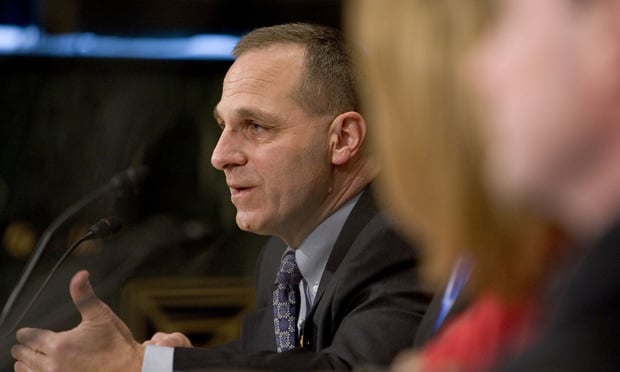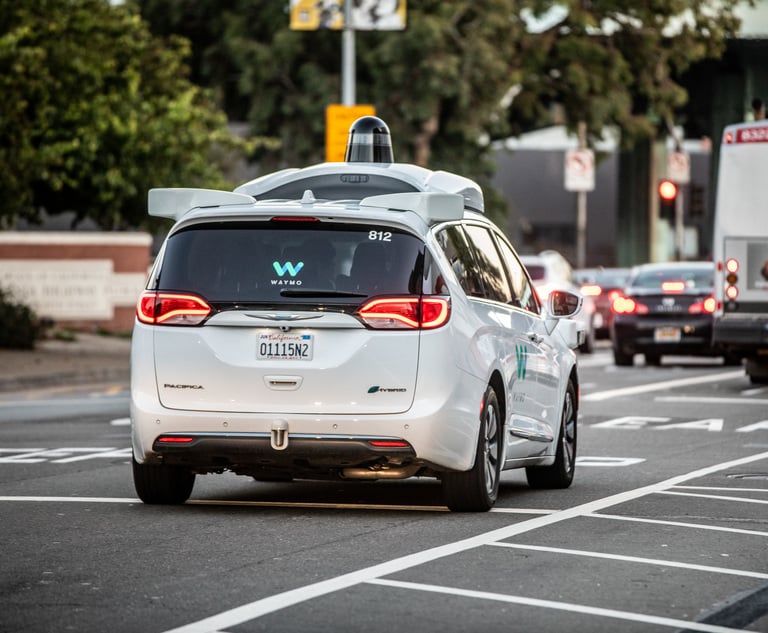VW Declined to Hire Louis Freeh for $15M. Now He's on the Other Side—and VW Is Crying Foul
In a motion to disqualify filed in San Francisco federal court, the VW team from Sullivan & Cromwell argue that Freeh's 'conflict of interest and receipt of confidential information' should bar him from serving as an expert witness for the plaintiffs.
January 15, 2020 at 01:29 AM
7 minute read
The original version of this story was published on Litigation Daily
 Louis Freeh. (Photo: Diego M. Radzinschi/ALM)
Louis Freeh. (Photo: Diego M. Radzinschi/ALM)
Four years ago, former FBI Director Louis Freeh was on the verge of being hired by Volkswagen to run its diesel emissions litigation—work for which he wanted a guaranteed $15 million over three years, plus 10% of the "savings the company and its subsidiaries yield and/or the costs saved by settlements," according to a draft engagement letter.
In the end, he didn't get the job—nor did VW bite a year later when he suggested that the automaker "keep me in mind for any future role, such as a monitor."
Now, Freeh—founder and chairman of consulting firm Freeh Group International Solutions and senior managing partner of affiliated law firm Freeh Sporkin & Sullivan—has turned up on the other side. He's serving as an expert witness for plaintiffs who opted out of VW's overarching civil settlement in 2016 and are suing the company instead.
 VW lawyers from Sullivan & Cromwell are crying foul.
VW lawyers from Sullivan & Cromwell are crying foul.
In a motion to disqualify filed on Monday in San Francisco federal court, the VW team led by Robert Giuffra Jr., Sharon Nelles, William Monahan, John McCarthy and Michael Steinberg argue that "Mr. Freeh's conflict of interest and receipt of confidential information disqualify him from serving as an expert adverse to defendants."
Freeh "engaged in extensive privileged and confidential discussions with Volkswagen's senior-most executives and counsel about the same diesel matters underlying this lawsuit, including discussing key documents and legal strategy," they continued. "Mr. Freeh's contemplated mandate would have included a role overseeing both this case and the exact same criminal matter that is the subject of his expert opinion."
Freeh in an email said he was out of the country this week and "can only refer you to my counsel here. As with any motion, there are two sides to the matter."
Fred Heather of Glaser Weil Fink Howard Avchen & Shapiro did not respond to a request for comment.
Freeh, who earned his J.D. from Rutgers School of Law in 1974, has a distinguished resume. He cut his teeth as an FBI special agent, moving on to become a top prosecutor in the Southern District of New York before President George H.W. Bush appointed him to the SDNY bench in 1991. Two years later, Freeh stepped down to head the FBI under President Bill Clinton, remaining on the job until 2001.
He did a stint in-house as general counsel of MBNA America Bank, and in Big Law at Pepper Hamilton, where he was chairman of the firm from 2013 to 2014. In 2016, he returned to Freeh Sporkin & Sullivan (which had launched in 2007 but unofficially merged with Pepper Hamilton in 2012). All three of the 18-lawyer firm's name partners are former federal judges.
Last year, the firm announced it had formed a "strategic alliance" with Los Angeles-based Glaser Weil—which along with Knight Law Group is representing opt-out plaintiffs suing VW.
While roughly 600,000 VW owners signed on to the class action settlement, selling their polluting diesel cars back to the company at a premium or opting for repairs plus cash, several hundred plaintiffs have balked at the deal. The first trial—a bellwether of sorts—involving the owners of seven affected vehicles is set to kick off in San Francisco before U.S. District Judge Charles Breyer on Feb. 18.
That's the case where Freeh has been tapped as an expert. He says he was paid $50,000 to produce his 21-page report and will charge plaintiffs $1,850 an hour for any future involvement.
His main conclusion: VW got off way too cheaply.
Freeh focused on the government's criminal case against VW, which settled for $2.8 billion in 2017.
The fine, which was approved by U.S. District Judge Sean Cox in the Eastern District of Michigan, "was far below the minimum fine provided for by the applicable Sentencing Guidelines," Freeh wrote. The actual criminal fine (on top of the $20 billion VW paid in civil settlements) should have been between $34 billion and $68 billion, he concluded.
According to Freeh, VW and the feds wrongly derived the base fine when they slashed the actual pecuniary loss from $17 billion to $8.5 billion.
Per Freeh, the reduction was based on "what the plea agreement characterized as the 'litigation risk' of a contested sentencing proceeding. No such reduction is provided in the Sentencing Guidelines or by the case authority cited in the plea agreement."
Moreover, he said, the plea agreement "failed to properly account for VW AG's culpability score (11) in determining the correct fine within the applicable range."
When Judge Cox greenlighted the deal, Freeh said he "did not know that employees at the level of the VW AG Management Board were involved in the emissions-related fraud, but now it is clear that the fraud went to the top of the company's hierarchy," Freeh said.
As a result, "due to the company's failure to disclose the extent of management's fraud, the sentencing court did not account for the criminal conduct reaching the highest levels of the organization."
VW's lawyers from Sullivan & Cromwell attacked the report on multiple grounds.
First, they said Freeh in reaching these conclusions was drawing on privileged communications—he allegedly retained more than 550 pages of communications with Volkswagen when he was short-listed for representing the company in the emissions scandal.
"The circumstances here go far beyond what other courts have found to be disqualifying," the Sullivan & Cromwell team wrote. "Here, the topics that Volkswagen discussed with Mr. Freeh are not only privileged, but squarely implicated by his proposed testimony. For instance, one of Mr. Freeh's main conclusions—that there was executive-level wrongdoing that Volkswagen concealed from the court and the prosecutors—is primarily based on a document that Volkswagen's counsel shared with Mr. Freeh to seek his legal advice on its implications."
"As such," they continued, "Mr. Freeh has put defendants in a catch-22: to effectively cross-examine Mr. Freeh, Volkswagen would need to waive the very privilege at issue or risk the jury erroneously concluding that his unspoken knowledge suggests undisclosed wrongdoing."
They also take issue with his assertion that the judge and DOJ prosecutors were unaware that top VW leaders played a role in the fraud, calling it speculation. Also, they point out that Cox at the sentencing said, "This is a case of deliberate, massive fraud perpetrated by VW management."
Further, the S&C lawyers argue Freeh's proposed testimony about the federal sentencing guidelines is irrelevant and unduly prejudicial, since the takeaway for jurors contemplating punitive damages would be that VW should have paid billions more in criminal fines.
But in an odd way, Freeh's report is a compliment to the legal team that beat him out for the job.
Because just think—if VW had hired Freeh, and he'd been the one to have gotten that deal for VW, he'd have been entitled to 10% of the savings—a cool $6 billion.
We hope you enjoyed this excerpt from Litigation Daily, the exclusive source for sharp commentary on mega court battles, winning strategies and the issues that obsess elite litigators. Click here to subscribe.
This content has been archived. It is available through our partners, LexisNexis® and Bloomberg Law.
To view this content, please continue to their sites.
Not a Lexis Subscriber?
Subscribe Now
Not a Bloomberg Law Subscriber?
Subscribe Now
NOT FOR REPRINT
© 2025 ALM Global, LLC, All Rights Reserved. Request academic re-use from www.copyright.com. All other uses, submit a request to [email protected]. For more information visit Asset & Logo Licensing.
You Might Like
View All
Shareholder Democracy? The Chatter Musk’s Tesla Pay Case Is Spurring Between Lawyers and Clients
6 minute read
Willkie Farr & Gallagher Drives Legal Challenge for Uber Against State's Rideshare Laws
5 minute read

EPA grants California authority to ban sales of new gas cars by 2035. Action faces reversal by Trump
Law Firms Mentioned
Trending Stories
- 1How ‘Bilateral Tapping’ Can Help with Stress and Anxiety
- 2How Law Firms Can Make Business Services a Performance Champion
- 3'Digital Mindset': Hogan Lovells' New Global Managing Partner for Digitalization
- 4Silk Road Founder Ross Ulbricht Has New York Sentence Pardoned by Trump
- 5Settlement Allows Spouses of U.S. Citizens to Reopen Removal Proceedings
Who Got The Work
J. Brugh Lower of Gibbons has entered an appearance for industrial equipment supplier Devco Corporation in a pending trademark infringement lawsuit. The suit, accusing the defendant of selling knock-off Graco products, was filed Dec. 18 in New Jersey District Court by Rivkin Radler on behalf of Graco Inc. and Graco Minnesota. The case, assigned to U.S. District Judge Zahid N. Quraishi, is 3:24-cv-11294, Graco Inc. et al v. Devco Corporation.
Who Got The Work
Rebecca Maller-Stein and Kent A. Yalowitz of Arnold & Porter Kaye Scholer have entered their appearances for Hanaco Venture Capital and its executives, Lior Prosor and David Frankel, in a pending securities lawsuit. The action, filed on Dec. 24 in New York Southern District Court by Zell, Aron & Co. on behalf of Goldeneye Advisors, accuses the defendants of negligently and fraudulently managing the plaintiff's $1 million investment. The case, assigned to U.S. District Judge Vernon S. Broderick, is 1:24-cv-09918, Goldeneye Advisors, LLC v. Hanaco Venture Capital, Ltd. et al.
Who Got The Work
Attorneys from A&O Shearman has stepped in as defense counsel for Toronto-Dominion Bank and other defendants in a pending securities class action. The suit, filed Dec. 11 in New York Southern District Court by Bleichmar Fonti & Auld, accuses the defendants of concealing the bank's 'pervasive' deficiencies in regards to its compliance with the Bank Secrecy Act and the quality of its anti-money laundering controls. The case, assigned to U.S. District Judge Arun Subramanian, is 1:24-cv-09445, Gonzalez v. The Toronto-Dominion Bank et al.
Who Got The Work
Crown Castle International, a Pennsylvania company providing shared communications infrastructure, has turned to Luke D. Wolf of Gordon Rees Scully Mansukhani to fend off a pending breach-of-contract lawsuit. The court action, filed Nov. 25 in Michigan Eastern District Court by Hooper Hathaway PC on behalf of The Town Residences LLC, accuses Crown Castle of failing to transfer approximately $30,000 in utility payments from T-Mobile in breach of a roof-top lease and assignment agreement. The case, assigned to U.S. District Judge Susan K. Declercq, is 2:24-cv-13131, The Town Residences LLC v. T-Mobile US, Inc. et al.
Who Got The Work
Wilfred P. Coronato and Daniel M. Schwartz of McCarter & English have stepped in as defense counsel to Electrolux Home Products Inc. in a pending product liability lawsuit. The court action, filed Nov. 26 in New York Eastern District Court by Poulos Lopiccolo PC and Nagel Rice LLP on behalf of David Stern, alleges that the defendant's refrigerators’ drawers and shelving repeatedly break and fall apart within months after purchase. The case, assigned to U.S. District Judge Joan M. Azrack, is 2:24-cv-08204, Stern v. Electrolux Home Products, Inc.
Featured Firms
Law Offices of Gary Martin Hays & Associates, P.C.
(470) 294-1674
Law Offices of Mark E. Salomone
(857) 444-6468
Smith & Hassler
(713) 739-1250






